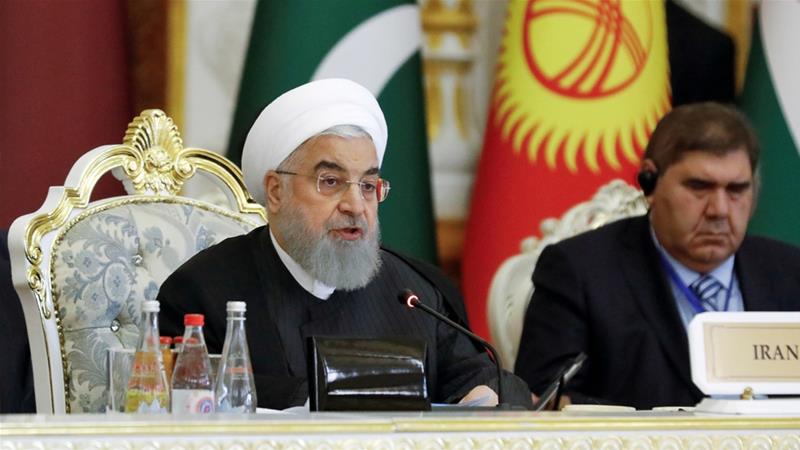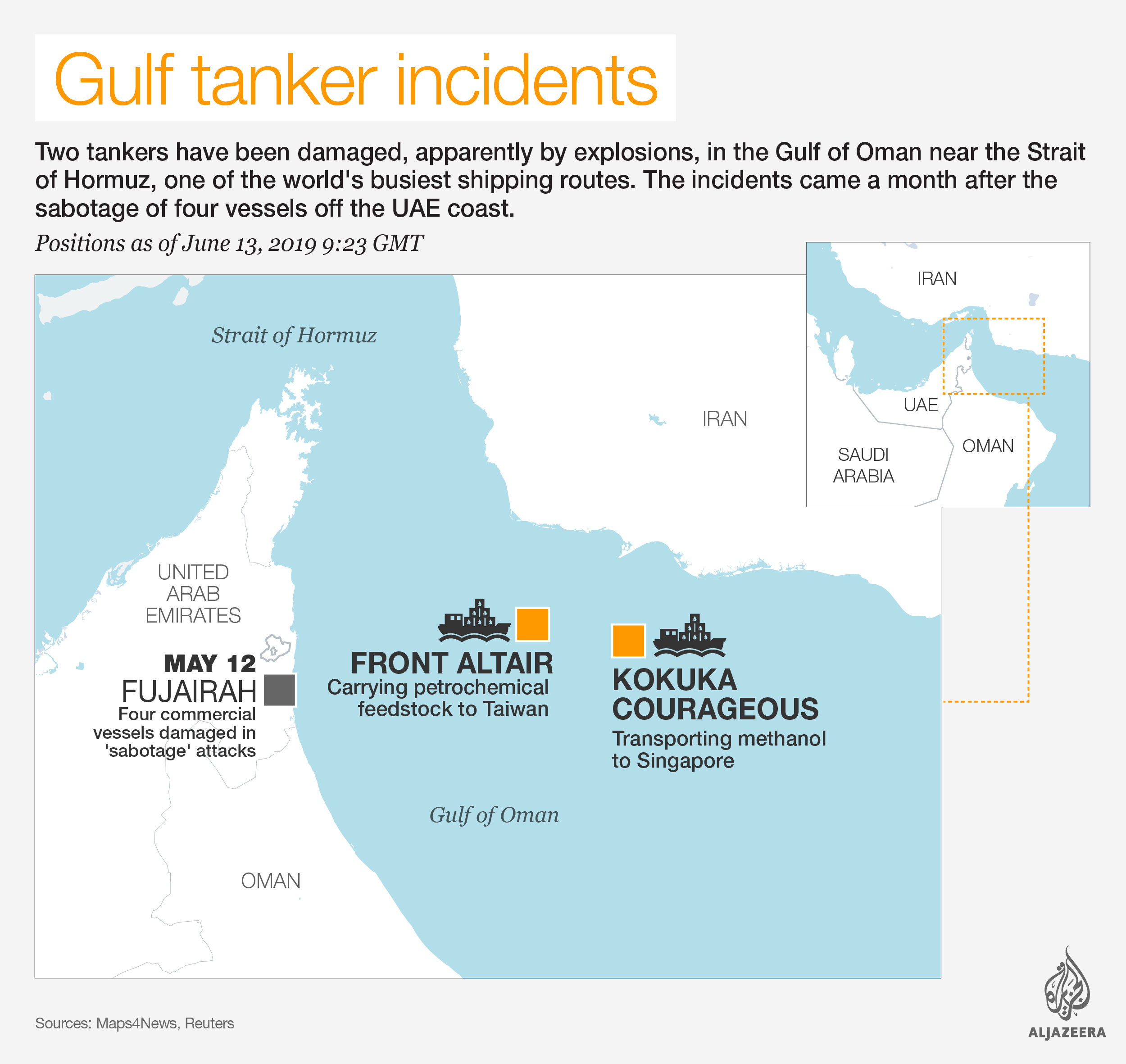Home » Middle East »
Iran renews ultimatum over nuclear deal amid tanker tensions
Rouhani says he needs to see ‘positive signals’ from other signatories, or Iran will further scale back its compliance.
Iran will continue scaling back compliance with its commitments under the nuclear deal unless other signatories show “positive signals”, the Iranian president told a meeting of Russian, Chinese and other Asian leaders in Tajikistan.
Iran stopped complying in May with some commitments in a 2015 nuclear deal that was agreed with global powers, a year after the United States unilaterally withdrew from the accord and tightened sanctions.
Tehran said in May that Iran would start enriching uranium at a higher level unless world powers protected its economy from US sanctions within 60 days.
“Obviously, Iran cannot stick to this agreement unilaterally,” President Hassan Rouhani told the Conference on Interaction and Confidence Building Measures in Asia.
“It is necessary that all the sides of this agreement contribute to restoring it,” he said, adding that Iran needed to see “positive signals” from other signatories to the pact, which include Russia, China, Britain, France and Germany.
He did not give details on what actions Iran would take or say what positive signals Tehran wanted to see.
France and other European signatories to the deal, which aimed to curb Iran’s nuclear ambitions, have said they wanted to save it, but many of their companies have cancelled deals with Tehran under financial pressure from the US.
Western powers have accused Iran of seeking to develop nuclear weapons, a charge Tehran denies, saying it wants nuclear technology for peaceful purposes.
Tanker incidents
Rouhani made no mention of attacks on two tankers in the Gulf of Oman this week, which Washington has blamed on Tehran, raising concerns about a confrontation.
Iran has denied any role in the attacks, calling the accusations “ridiculous” and “dangerous”.
On Friday, acting US Secretary of Defense Patrick Shanahan said the administration of President Donald Trump was focused on building international consensus following the oil tanker attacks near the Strait of Hormuz.
The two vessels – the Japanese-owned Kokuka Courageous and the Norwegian-owned Front Altair – were damaged on Thursday morning as they were leaving the Gulf of Oman, the second such incident in four weeks that sent Brent crude prices up and heightened tensions in the region.
Shanahan, asked later whether he was considering sending more US troops or military capabilities to the Middle East, said: “As you know we’re always planning various contingencies.”
But he then returned to the issue of building consensus.
“When you look at the situation, a Norwegian ship, a Japanese ship, the Kingdom of Saudi Arabia, the UAE, 15 percent of the world’s oil flows through the Strait of Hormuz,” he said.
“So we obviously need to make contingency plans should the situation deteriorate. We also need to broaden our (international) support for this international situation,” he added.
Tanker incident video
Shanahan said the Pentagon’s role would include sharing intelligence, as the US military’s Central Command did on Thursday by publicly releasing a grainy video it claimed showed Iran’s military removing an unexploded mine from Kokuka Courageous, hours after the suspected attacks.
Iran said the video proved nothing and that Tehran was being made into a scapegoat.
“The more information that we can declassify, the more information we can share, we will. And that’s our intent,” Shanahan said.
The release of the black-and-white footage came after Secretary of State Mike Pompeo said US intelligence agencies had concluded that Iran was responsible for the attacks, without offering concrete evidence.
On Friday, in a TV interview on Fox News, Trump said, “Iran did do it”.
“You know they did it because you saw the boat,” Trump told the Fox and Friends show. “I guess one of the mines didn’t explode and it’s probably got essentially Iran written all over it.”
But Yutaka Katada, owner of the Kokuka Courageous, cast doubt on part of the US account, telling reporters on Friday that the vessel’s crew saw a “flying object” before a second blast on the boat.
Calling reports of a mine attack “false”, he said: “The crew was saying it was hit by a flying object … To put a bomb at the side of the boat is not something we are considering.”
For its part, Iran rejected the accusations as the United Nations, Russia and Qatar called for an international investigation into the reported attacks.
Mohammad Javad Zarif, Iran’s foreign minister, said the US had “immediately jumped to make allegations against Iran without a shred of factual or circumstantial evidence”.
The allegation “only makes it abundantly clear” that the US and its regional allies, Saudi Arabia and the United Arab Emirates, were moving to a “Plan B”, Zarif said, which was to “sabotage diplomacy” as Japanese Prime Minister Shinzo Abe visited Iran to defuse escalating US-Iran frictions.
Arab League caution
On Friday, the head of the Arab League called on the Iranians to “be careful and reverse course”.
Secretary-General Ahmed Aboul Gheit noted, after meeting with UN Secretary-General Antonio Guterres at UN headquarters in New York, that there are conflicting reports about how Thursday’s tanker incidents occurred.
“We believe that responsibilities need to be clearly defined,” he said. “The facts will be revealed, I am sure, it’s only a matter of time.”
Aboul Gheit added “My call to my Iranian – and I call them Iranian brothers: Be careful and reverse course because you’re pushing everybody towards a confrontation that no one would be safe if it happens.”
The British government said it agreed with the US conclusion that Iran attacked the tankers.
The Foreign Office said in a statement that its own assessment concluded “it is almost certain that a branch of the Iranian military,” the Islamic Revolutionary Guard Corps, had attacked the tankers.
It said it also believed Iran was behind an attack last month on four tankers near the UAE port of Fujairah.
On May 12, days after Washington announced the military deployment, four oil tankers near the port were damaged in what the UAE called “sabotage attacks”.
The US blamed Iran for the incidents, saying Iranian-made limpet mines were used in the attacks. Tehran also rejected these claims.
Source: Read Full Article




